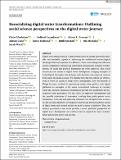Files in this item
Resocializing digital water transformations : outlining social science perspectives on the digital water journey
Item metadata
| dc.contributor.author | Hoolohan, Claire | |
| dc.contributor.author | Amankwaa, Godfred | |
| dc.contributor.author | Browne, Alison | |
| dc.contributor.author | Clear, Adrian | |
| dc.contributor.author | Holstead, Kirsty Lee | |
| dc.contributor.author | Machen, Ruth | |
| dc.contributor.author | Michalec, Ola | |
| dc.contributor.author | Ward, Sarah | |
| dc.date.accessioned | 2021-02-04T10:30:18Z | |
| dc.date.available | 2021-02-04T10:30:18Z | |
| dc.date.issued | 2021-02-03 | |
| dc.identifier | 272687462 | |
| dc.identifier | 91fcd983-9f25-45e7-9667-1e56e4cea4db | |
| dc.identifier | 85100252897 | |
| dc.identifier | 000614124500001 | |
| dc.identifier.citation | Hoolohan , C , Amankwaa , G , Browne , A , Clear , A , Holstead , K L , Machen , R , Michalec , O & Ward , S 2021 , ' Resocializing digital water transformations : outlining social science perspectives on the digital water journey ' , Wiley Interdisciplinary Reviews: Water , vol. Early View , e1512 . https://doi.org/10.1002/wat2.1512 | en |
| dc.identifier.issn | 2049-1948 | |
| dc.identifier.uri | https://hdl.handle.net/10023/21373 | |
| dc.description | Funding information: National Cyber Security Centre; Scottish Government, Grant/Award Number: Hydro Nation Scholars; University of Manchester, Grant/Award Number: Presidential fellowship; University of Manchester, Grant/Award Number: SEED PGR scholarship (Amankwaa). | en |
| dc.description.abstract | Digital water transformation is often written about as though universally desirable and inevitable, capable of addressing the multifaceted socioecological challenges that water systems face. However, there is not widespread reflection on the complexities, tensions and unintended consequences of digital transformation, its social and political dimensions are often neglected. This article introduces case studies of digital water development, bringing examples of technological innovation into dialogue with literature and empirical research from across the social sciences. We examine how Big Data affects our observations of water in society to shape water management, how the Internet of Things becomes involved in reproducing unjust water politics, how digital platforms are entangled in the varied sociocultural landscape of everyday water use, and how opensource technologies provide new possibilities for participatory water governance. We also reflect on regulatory developments and the possible trajectories of innovation resulting from public‐private sector interactions. A socially and politically informed view of digital water is essential for just and sustainable development, and the gap between industry visions of digital water and research within the social sciences is inhibitive. Thus, the analysis presented in this article provides a novel, pluralistic perspective on digital water development and outlines what is required for more inclusive future scholarship, policy and practice. | |
| dc.format.extent | 17 | |
| dc.format.extent | 2933908 | |
| dc.language.iso | eng | |
| dc.relation.ispartof | Wiley Interdisciplinary Reviews: Water | en |
| dc.subject | Digital water | en |
| dc.subject | Imaginaries | en |
| dc.subject | Politics | en |
| dc.subject | Sustainable transformations | en |
| dc.subject | Water futures | en |
| dc.subject | T Technology (General) | en |
| dc.subject | HD28 Management. Industrial Management | en |
| dc.subject | T-NDAS | en |
| dc.subject | NIS | en |
| dc.subject.lcc | T1 | en |
| dc.subject.lcc | HD28 | en |
| dc.title | Resocializing digital water transformations : outlining social science perspectives on the digital water journey | en |
| dc.type | Journal article | en |
| dc.contributor.institution | University of St Andrews. School of Management | en |
| dc.identifier.doi | 10.1002/wat2.1512 | |
| dc.description.status | Peer reviewed | en |
This item appears in the following Collection(s)
Items in the St Andrews Research Repository are protected by copyright, with all rights reserved, unless otherwise indicated.

